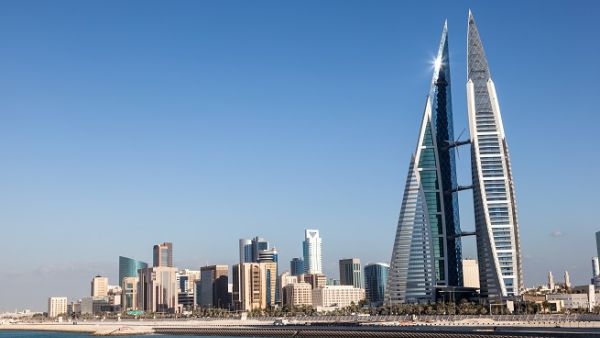Bahrain’s gross domestic product or GDP in current prices grew by 5.1 per cent annually in the first three months of the year (Q1), according to data published in the latest Bahrain Economic Quarterly (BEQ).
The June 2018 quarterly report produced by the Economic Development Board (EDB) shows that in nominal terms, the GDP expanded in Q1 thanks to significantly higher oil prices that more than countered the drop in output.
This compared with 9.6pc nominal growth during 2017 as a whole, again thanks in part to a sustained recovery in oil prices during the year.
Read More
Expats Urge Bahrain to Reconsider Minimum Wage Rule for Dependent Visas
Hundreds of Expats Suffer from Unpaid Wages in Bahrain
The positive trajectory of accelerating growth over the past two years, however, was interrupted by a temporary drop in the oil sector during the quarter.
The kingdom’s annual pace of expansion turned negative during the opening months of 2018 due to a sharp drop in oil production, when compared with 2017’s revised headline real growth of 3.8pc.
In the first quarter this year, the oil sector contracted by an annual 14.7pc as a result of maintenance-related output cuts on the offshore Abu Safa field.
This resulted in negative 1.2pc annual headline growth.
Non-oil growth, by contrast, remained firmly positive, although the 1.9pc pace of expansion still fell markedly short of the 4.8pc rate of non-oil growth achieved during 2017 as a whole.
This deceleration is likely primarily due to a combination of base effects after a period of accelerating growth as well as the inevitable unevenness in infrastructure project implementation, said the EDB.
The government services sector expanded by an annual 4.6pc whereas the non-oil private sector expanded by 1.4pc.
The sector breakdown of growth was very uneven, in marked contrast to the broad-based positive momentum observed in preceding quarters.
The fastest growing single sector in Q1 was construction which expanded by an annual 6.7pc.
This in fact marked a sharp acceleration from the 1.8pc pace seen during 2017 as a whole and suggests that a new phase of construction-led expansion in the non-oil sector may be upon us after a period of decelerating growth.
Given the strength of the forward and backward linkages of infrastructure activity, this reversal should contribute a more broad-based acceleration in non-oil growth in the months ahead.
Historically, construction activity has been an important driver of expansion in other sectors, such as manufacturing, trade, real estate, and financial services, the report said.
Related to construction, the real estate and business activities sector posted 3.7pc growth in Q1.
The manufacturing sector expanded by 4.2pc in a clear acceleration over the 1.1pc pace seen during 2017 as a whole.
An unusual 9.4pc contraction in the hotels and restaurants sector during Q1 may partly be the result of base effects after a robust 9.5 expansion during 2017, the EDB said.
However, the hospitality sector numbers have historically also tended to display some volatility as precisely reporting frequently materialises with a lag.
The trade sector contracted by 2.7pc, again in a marked departure from the 8.5pc expansion it witnessed during 2017 as a whole.
In both cases, the corrections are likely to be temporary after a rapid build-up in new supply.
According to the EDB, in spite of slight deceleration in non-oil growth during the fourth quarter of 2017 and the first quarter this year, the near-term outlook for the Bahraini economy remains benign.
A number of new projects, led above all by the Bapco Modernisation Programme, are breaking ground this year.
This in turn should underpin a broader positive growth momentum which may benefit further from tactical buying ahead of the VAT introduction.
The regional backdrop is likely to become increasingly supportive of growth in Bahrain as the economic transformation makes headway against a generally more positive oil price environment.
On the negative side, the gradually increasing cost of capital may curb growth marginally, albeit against the backdrop of a generally favourable liquidity situation in the banking sector.
In 2019, the launch of Alba Line 6 will provide a major impetus to manufacturing sector growth and should support the further development of downstream manufacturing as well.
Unprecedented infrastructure investment has been a key source of non-oil growth and continuity for the Bahraini economy in recent years.
During Q1, among other things, the GCC Development Fund saw a rapid increase in the pipeline of tendered projects to a cumulative total of just over $5.1 billion.
The cumulative aggregate volume of active projects exceeded $3.5bn in the second quarter this year while the total cash flow to date rose to some $1.65bn as compared with $913 million a year earlier.
Also private and semi-government projects are making headway, with $170m of contract awards reported in the country just in April this year.
The regional backdrop is set to become more favourable for Bahrain’s growth, with positive spill-overs from the rest of the region likely to increase as region-wide growth accelerates.
More benign fiscal and liquidity conditions should support financial market and investment activity in the country, said the EDB.








